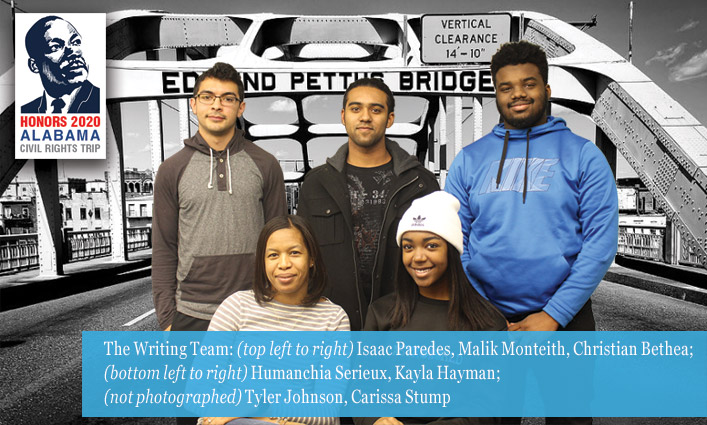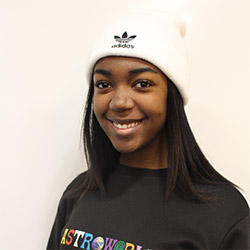
Iconic images of the civil rights movement are seared into the collective memory of our society. Whether it’s Martin Luther King, Jr. and other civil rights activists peacefully marching from Selma to Montgomery, Alabama; Rosa Parks being fingerprinted for defiantly refusing to give up her seat on the bus; or a young John Lewis, civil rights leader and current Georgia congressman, being brutally beaten by a state trooper as he marched for voting rights, the images have left an indelible mark in our minds and represent a painful truth about our country’s history. For John Jay Honors students visiting Alabama on January 13 – 17, personally seeing some of the places where monumental civil rights events took place offers an ideal opportunity to study and contemplate the civil rights movement through their own unique perspective.

The Honors students—led by Professor Raymond Patton, Ph.D., Honors Program Faculty Director—will immerse themselves in civil rights history, visiting sites such as: the Edmund Pettus Bridge, the Dexter Avenue King Memorial Baptist Church, the National Voting Rights Museum, the Civil Rights Memorial, the Southern Poverty Law Center, the Equal Justice Initiative/The National Memorial for Peace and Justice/The Legacy Museum, and The Martin Luther King, Jr. Center for Nonviolent Social Change.

As a part of their experience, and a way to reflect on what they see and feel, the students have been assigned to different project teams—one of which is the writing team. Throughout the trip the writing team will regularly meet, share their thoughts, and write personal essays, poems, letters, and journal entries that articulate their feelings about the civil rights sites, museums, and memorials that they’re visiting.
Senior Editor/Writer, Andrea Clark, who will be leading the writing team, sat down with the students to learn more about their expectations and hopes for the trip.
 Kayla Hayman, ’23
Kayla Hayman, ’23
Major: Forensic Psychology
Hometown: Levittown, NY
I love museums, but I don’t really get a chance to see African-American museums or civil rights-related museums here in New York. That’s why I’m really excited to see the museums and memorials on the trip itinerary. My mom’s side of the family is from the South, specifically South Carolina. When they tell me stories about what it was like for them growing up in the South, I can’t really relate because I grew up in New York. It’ll be interesting for me to see firsthand how they lived and what life was like for them.
 Malik Monteith, ’23
Malik Monteith, ’23
Major: Law and Society
Hometown: Queens, NY
I’m really excited to walk across the Edmund Pettus Bridge in Selma, Alabama. It’s going to be a powerful moment, knowing that not that long ago, Martin Luther King, Jr. and a whole crowd of empowered people took that same walk, trying to make a positive change in the world. My family is from Jamaica, but I’m also African-American. It’s going to be interesting to see the parallels between African-American history and Caribbean history.
 Isaac Paredes, ’21
Isaac Paredes, ’21
Major: Cell and Molecular Biology
Hometown: Bronx, NY
It’ll be interesting to see a new atmosphere, especially as a semi-conservative living in New York City and going to John Jay College of Criminal Justice. Seeing a different perspective could be helpful in developing how I might end up seeing the world in the future. And, it also acts as a step outside of my comfort zone, because I’m a science student, and I kind of block out everything other than the science. I feel like the experience could connect mostly with my grandmother on my father’s side. She was from Ecuador and was granted citizenship through a lottery system. She was in New York during a time of intense poverty in certain areas. I don’t see a direct connection to her and the civil rights movement. However, I do see a connection in the united or communal struggle that individuals from different national backgrounds naturally have when they want to get out of an area and move toward something better.
 Humanchia Serieux, ’20
Humanchia Serieux, ’20
Major: Anthropology
Hometown: Brooklyn, NY
I’m from the Caribbean, Saint Lucia, and it’s a little difficult for me to fully understand how African-Americans lived during the civil rights movement—even being African-American myself. Understanding that history is very emotional for me. I want to see how their experiences were similar or different from mine. My great grandfather was African, and I remember stories that my great grandmother would tell me about her struggles. I think the histories between the civil rights experience in the South and my own family’s history in Saint Lucia are commingled.
 Christian Bethea, ’23
Christian Bethea, ’23
Major: Forensic Psychology
Hometown: Brooklyn, NY
We’re basically going to the birthplace of the civil rights movement. And for me, an African-American male, it’s pretty interesting. I’m actually very excited that we’re going to a high school in Alabama and meeting students in the South. I’m curious what their experiences are like as students compared to being a student in New York City.
 Tyler Johnson, ’22
Tyler Johnson, ’22
Major: Humanities and Justice
Hometown: Bronx, NY
I'm looking forward to the raw and uncensored stories that we will be listening to. I look forward to this because as an African-American woman, it is vital for me to comprehend the history that lies within me. Although we are in the 21st century, we are still seeing social, political, and economic deficits that stem back to the civil rights era and slavery that need to be addressed.
 Carissa Stump, ’20
Carissa Stump, ’20
Major: Forensic Psychology
Hometown: Long Island, NY
I’m excited to go to the Southern Poverty Law Center (SPLC). After graduate school, I’d like to work at a justice institute, and I think that my goals are closely aligned with what will be presented at the SPLC. I decided I wanted to work at a justice institute after taking a class on mass incarceration. This class really opened my eyes to the systemic racial injustice in the United States. It also taught me that even without issues of overt bigotry, the problems in our country would still exist because systems in the United States were built to silence the voices of black and brown Americans. As I learn more about these topics, I’m looking for opportunities for large-scale changes. That’s what I hope to see at the SPLC.
- Honors 2020 Alabama Civil Rights Trip: Exploring Selma
- Honors 2020 Alabama Civil Rights Trip: A Conversation with John Jay President Karol V. Mason
- Honors 2020 Alabama Civil Rights Trip: An Introspective Essay From Denny T. Boodha ’22
- Honors 2020 Alabama Civil Rights Trip: A Reflective Poem From Isaac Paredes ’21



